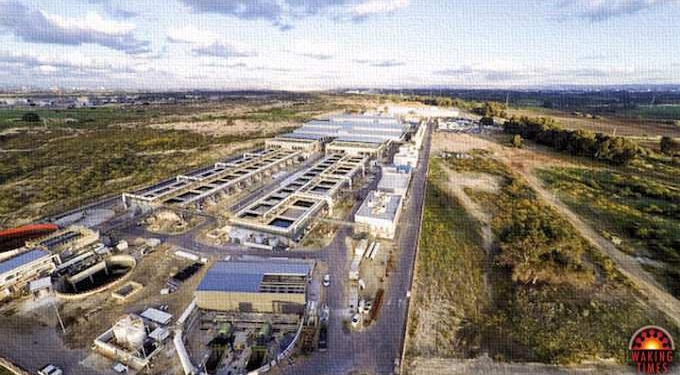
By Christina Sarich | Waking Times
Wars in the Middle East have been fought over oil, but with the area drying up, water is the new commodity which incites both civil and international discord. In the Fertile Crescent, the only country which isn’t suffering from acute water stress is Israel – not only for their controversial ability to control water in the region but for their productivity in helping to bring about the era of desalinization.
Changes over the past several decades have made the Fertile Crescent much less fertile. Using satellite images of the region, scientists discovered that only 10% of the area’s marshlands remain. All the rest have dried up, leaving mainly desert with patches of salt.
Israel’s new Sorek desalination plant, the largest reverse-osmosis facility in the world is now making a surplus of water in an area previously known to be one of the driest countries on earth. 1.2 million people now have drinkable, desalinated water using new technologies developed by the Zuckerberg Institute. 55 percent of Israel’s domestic water now comes from the Mediterranean Sea, through the Sorek plant.
Only a few years ago, the country was in the middle of its worst droughts in at least 900 years. With a national campaign to conserve and reuse water along with the massive desalination plant, Israel now has a water surplus.
Edo Ba-Zeev, an expert on biofouling who helped develop the technology for the plant, helped to change the attitude of researchers who previously saw desalination as a last resort.
Most desalination plants work by pushing seawater through membranes that contain microscopic pores. The water gets through, leaving the salt behind, and then you have potable water. The only problem with this system is that micro-organisms typically begin to colonize the membranes and block the pores. Controlling them usually requires expensive cleaning which relies on chemical treatment of the plant.
Bar-Zeev and his colleagues developed a chemical-free system using porous lava stone to capture the microorganisms before they reach the membranes. It’s just one of many breakthroughs in membrane technology that have made desalination much more efficient, and led Israel to be a literal oasis in the Middle East.
The plant was originally meant to improve the area along the Negev Desert, but it has been so successful, it is being reimagined to be applied to the entire Fertile Crescent, not to mention other places around the world that are currently suffering from drought – Maharashtra, India, Beijing China, Mexico City, Mexico, vast stretches of Africa, and California’s Central Valley notwithstanding.
The lack of water has been a major contributor to stress in the Middle East (as in other parts of the world), but Bar-Zeev believes that water can be a bridge, even between former enemies, with the successful venture of desalination.
About the Author
Christina Sarich is a staff writer for Waking Times. She is a writer, musician, yogi, and humanitarian with an expansive repertoire. Her thousands of articles can be found all over the Internet, and her insights also appear in magazines as diverse as Weston A. Price, Nexus, Atlantis Rising, and the Cuyamungue Institute, among others. She was recently a featured author in the Journal, “Wise Traditions in Food, Farming, and Healing Arts,” and her commentary on healing, ascension, and human potential inform a large body of the alternative news lexicon. She has been invited to appear on numerous radio shows, including Health Conspiracy Radio, Dr. Gregory Smith’s Show, and dozens more. The second edition of her book, Pharma Sutra, will be released soon.
This article (900 Year Drought Reversed with New Water Desalination Technology) was originally created and published by Waking Times and is published here under a Creative Commons license with attribution to Christina Sarich and WakingTimes.com. It may be re-posted freely with proper attribution, author bio, and this copyright statement. Please contact WakingTimes@gmail.com for more info.















